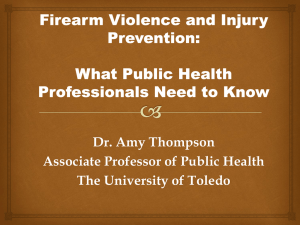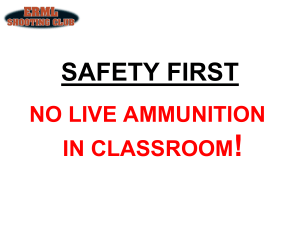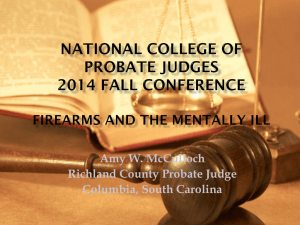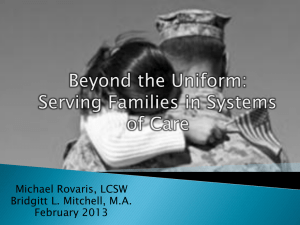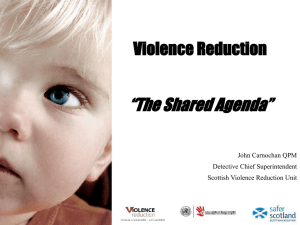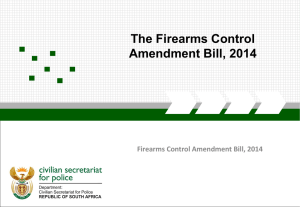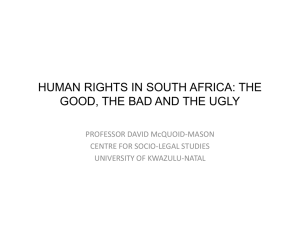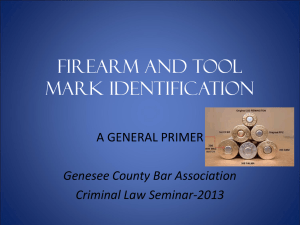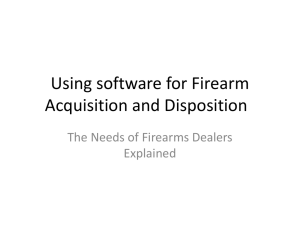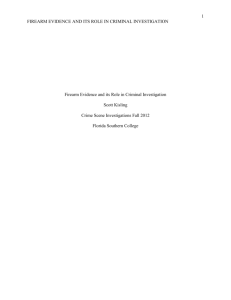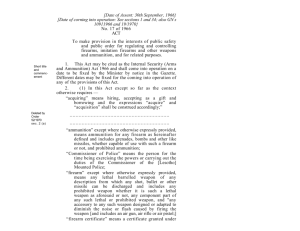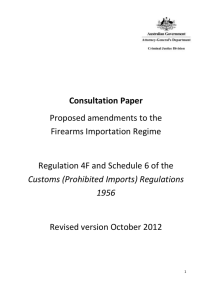Domestic_Violence_and_Federal_Gun_Control ()
advertisement
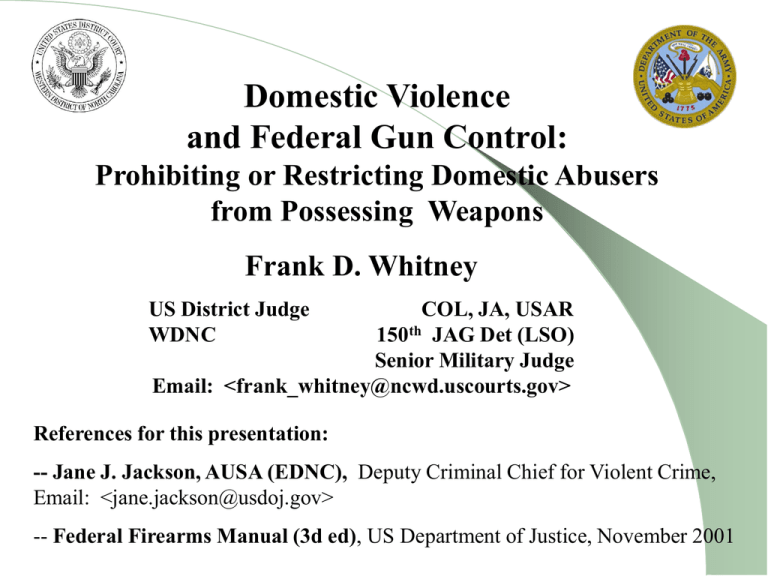
Domestic Violence and Federal Gun Control: Prohibiting or Restricting Domestic Abusers from Possessing Weapons Frank D. Whitney US District Judge WDNC COL, JA, USAR 150th JAG Det (LSO) Senior Military Judge Email: <frank_whitney@ncwd.uscourts.gov> References for this presentation: -- Jane J. Jackson, AUSA (EDNC), Deputy Criminal Chief for Violent Crime, Email: <jane.jackson@usdoj.gov> -- Federal Firearms Manual (3d ed), US Department of Justice, November 2001 Gun Control Act of 1968 (GCA) Title 18, U.S.C. Chapter 44 Lautenberg Amendment of 1996: Passed with almost unanimous support and represents Congress’s recognition that “anyone who attempts or threatens violence against a loved one has demonstrated that he or she poses an unacceptable risk, and should be prohibited from possessing firearms.” -- 142 Cong. Rec. S11,877 (daily ed. Sept. 30, 1996) GCA Prohibition Title 18, U.S.C. § 922(g) Title 18, U.S.C. § 922(g) provides: It shall be unlawful for any person … [who is a prohibited person] … to ship or transport in interstate or foreign commerce, or possess in or affecting commerce, any firearm or ammunition; or to receive any firearm or ammunition which has been shipped or transported in interstate or foreign commerce. Prohibited Persons under the GCA Felons Fugitives (under indictment for a felony) Unlawful users of or addicts to a controlled substance Persons who have been adjudicated as mentally “defective” or who have been involuntarily committed to a mental institution; illegal aliens and non-immigrant aliens Persons dishonorably discharged from the armed forces Persons who have renounced their U.S. citizenship Persons who are the subject of a qualifying domestic protective order (added in 1994 by same Violent Crime Control Act which created Violence Against Women Act criminal statutes) Persons convicted of a “misdemeanor crime of domestic violence” (added in 1996 by Lautenberg Amendment) Lautenberg Amendment to the GCA: “Misdemeanor Crime of Domestic Violence” Lautenberg: Title 18, U.S.C. § 922(g)(9) and (d)(9) Persons convicted of “qualifying” misdemeanor crimes of domestic violence may not possess (g(9)) or sell or dispose of (d(9)) firearms or ammunition. Retroactive to and prospective from their effective date of September 30, 1996. The misdemeanor must have had as an element the use or attempted use of force, or threatened use of a deadly weapon. Title 18, U.S.C. § 922(g)(9) and (d)(9) EXCEPTIONS: A person has not been convicted of a qualifying MCDV: If the person was not represented by counsel – unless he or she knowingly and intelligently waived the right to counsel; If the person was entitled to a jury trial AND the case was not tried by a jury – unless the person knowingly and intelligently waived the right to jury trial; If the conviction was set aside or expunged; the person was pardoned; or the person’s civil rights – the right to vote, sit on a jury, and hold elected office – were restored Qualifying Misdemeanor Crime Misdemeanor Crime Committed by: Current or former spouse Parent Guardian of the victim Person who cohabits or has cohabited as a spouse, parent, guardian, or Person similarly situated to a spouse, parent or guardian Offender/Victim Relationship Relationship does not have to be an element of the underlying offense; therefore simple assault and battery conviction may qualify. United States v. Smith, 171 F.3d 617 (8th Cir. 1999). “It is the position of the Department [of Justice] that this definition includes all misdemeanors that involve the use or attempted use of physical force (e.g., simple assault, assault and battery), if the offense is committed by one of the defined parties. This is true whether or not the statute specifically defines the offense as a domestic violence misdemeanor.” Federal Firearms Manual (3d ed), US Dep’t of Justice, p. 118. WHO COHABITS AS A SPOUSE? FACTORS TO CONSIDER: United States v. Costigan, Cr. No. 00-9-B-H, 2000 U.S. Dist. LEXIS 8625 (D. Me. 2000), aff’d, No. 00-2457, 2001 U.S. App. LEXIS 16769 (1st Cir. 2001) shared residence intimate relations length of the relationship expectations of fidelity and monogamy shared household duties regularly sharing meals together joint assumption of child care providing financial support moving as a family unit joint recreation and socialization recognition of the livein relationship by family and friends as indicated by visits to the residence Is “force/attempted force” an element of the offense? Permissible sources include: Judgment of conviction* Plea colloquy or plea agreement Jury instructions Police report incorporated in the complaint Sentencing order “OFFICIAL USE” EXEMPTION DOES NOT APPLY TO “MISDEMEANOR CRIMES OF DOMESTIC VIOLENCE” 18 USC 925(a)(1): The general rule is that those persons prohibited under the GCA from possessing a firearm or ammunition my be “… issued [a firearm and/or ammunition] for the use of, the United States or any department or agency thereof or any State or any department, agency, or political subdivision thereof. . . .” BUT . . . “OFFICIAL USE” EXEMPTION DOES NOT APPLY TO MCDVs cont’d The “official use” section of the CGA (18 U.S.C. 925(a)(1)) expressly exempts MCDVs, thus: Military personnel/police officers subject to MCDVs may NOT possess firearms or ammunition for use in performing official duties as well as in their personal capacity. Title 18, U.S.C. § 922(d)(9) Transfer of Firearm It is illegal to transfer a firearm or ammunition to: A person convicted of a misdemeanor crime of domestic violence Transferor must have known Not “knowing” if purchaser/transferor states that he/she has not been convicted of misdemeanor crime of domestic violence Violent Crime Control Act – Violence Against Women: Possession of Firearm While Subject to an Order of Protection Possession of Firearm While Subject to Order of Protection Title 18, U.S.C. § 922(g)(8) & (d)(8) This section makes it illegal for individuals who are the subject of a final restraining order to purchase, receive or possess a firearm. The gun ban is very inclusive and applies to almost all types of firearms destructive devices and ammunition. Antique firearms are not included within the ban. Title 18, U.S.C. § 922(g)(8) Title 18, U.S.C. § 921(a)(32) defines the class of person protected as an intimate partner to be: A spouse or former spouse of the defendant An individual who is a parent to the child of the defendant A person who cohabits or has cohabited with the defendant – Note: only final protective orders involving intimate partners are covered by this ban. “Intimate partner” does not include a girlfriend or boyfriend with whom the defendant does not and has not resided. Title 18, U.S.C. § 922(g)(8) Protective Orders Must: HEARING - Defendant received actual notice and had an opportunity to participate RESTRAINS FUTURE CONDUCT - Order restrains defendant from harassing, stalking or threatening the intimate partner, or child; order restrains defendant from engaging in other conduct that would place the intimate partner in reasonable fear of bodily injury to the partner or child CREDIBLE THREAT OR PHYSICAL FORCE - Order includes a finding that defendant is a credible threat to the physical safety of the intimate partner or child; or order, prohibits the use, attempted use, or threatened use of physical force against the intimate partner or child that would reasonably be expected to cause bodily injury North Carolina AOC Form: Domestic Violence Order of Protection AOC-CV-306, Rev. 3/04 “Federal Law makes it a crime for you to possess, transport, ship or receive any firearm or ammunition while this order is in effect even if this order does not prohibit you from possessing firearms. (18 U.S.C. Section 922(g)(8)).” “OFFICIAL USE” EXEMPTION & PROTECTION ORDERS 18 USC 925(a)(1): The prohibition against possession of firearms by persons subject to qualifying protection orders does not apply to the receipt or possession of any firearm or ammunition “… issued for the use of, the United States or any department or agency thereof or any State or any department, agency, or political subdivision thereof.” Title 18, U.S.C. § 922(d)(8) Transfer of Firearm It is illegal to transfer a firearm or ammunition to: A person subject to a court protection order – Order restrains the person from harassing, stalking or threatening intimate partner or child of intimate partner Requires knowledge that the transferee was subject to a protection order Summary: So Under the GCA and VAWA Who Can Possess for Official Use FELONS may possess under the “official use” exception (but generally felons may not enlist in the first place under 10 U.S.C. § 504) FUGITIVES may possess in theory (but it is likely they would be taken into custody before deploying) Those subject to a DOMETIC VIOLENCE PROTECTIVE ORDER may possess under the “official use” exception (but it is best to get an order amended or terminated before deployment) Those convicted of a MISDEMEANOR CRIME OF DOMESTIC VIOLENCE may NOT possess because they may never possess a firearm while subject to United States jurisdiction (including an overseas military installation)

